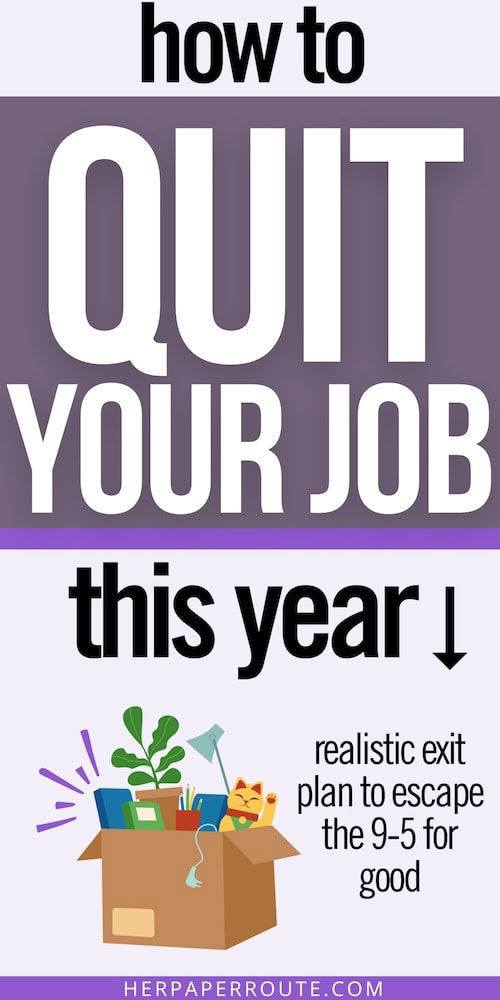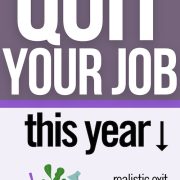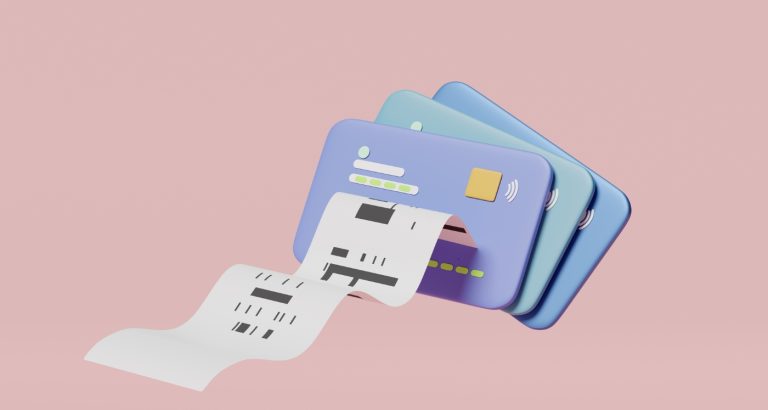I Don’t Want to Work Anymore: Your Exit Plan

Many of us have had moments where we think, “I don’t want to work anymore!” For some people, it’s daily!
It’s natural to have moments where the daily grind feels overwhelming, where one dreams of a life where work is optional. But for some of us, we work hard to MAKE traditional work optional.
As an affiliate partner of various brands and sponsored content, HerPaperRoute may earn commission on qualifying purchases. Disclaimer
Imagine how amazing it would be to gain the freedom to pursue your passions, spend time with loved ones, and actually live life on your own terms, without having to go to work?
If you find yourself screaming “I don’t want to work anymore – ever again!” that’s cool, it’s possible. You’ll just need a solid plan to support your current spending habits.
And a solid plan I shall give you! In this article, I’m providing the steps you need to be empowered with the knowledge and tools necessary to achieve financial independence and explore alternative income streams beyond traditional employment.

Nearly a Decade Ago, I Decided That I Didn’t Want to Work Anymore, In A Traditional Sense.
Here’s What I Did Next.
If the thought of work leaves you feeling uninspired, I don’t blame you. I was in the workforce from age 13 – 31, and I disliked everything about being an employee.
The commute, the small talk, having a boss, everything!
I woke up one day in 2016 and realized that working in a traditional system was NOT for me, and so I made the decision to leave the workforce for good.
I pursued passive income streams, and life as a content creator and let me tell you, it was the best decision!
Although some days are stressful, it’s never as bad as a day when I was working at an office, for someone else’s company.
Contrary to what society wants us to believe, you’re actually not obligated to stay in a job that doesn’t bring you joy.
You have every ability to find fulfillment in your life. When it comes to your financial goals, it could simply be exploring new paths in your current role or company, or pursuing a new venture altogether that looks totally different than anything you’ve done thus far.
Leaving The Workforce To Pursue Other Means Of Income vs Refusing To Work In Any Form
It’s important to distinguish between not wanting to work due to specific job aspects (we’ve all had a crappy job or boss!) versus a complete aversion to working altogether.
Maybe you just want to take a sabbatical with the intention to return later. Or perhaps you want to throw in the towel for good.
Either way, you don’t have to work a traditional job, but you do need some form of income coming in.
So you’ll need to allot yourself the time to design an income plan. Money is essential for maintaining our lifestyles, after all.
The good news is that thanks to the Internet there are thousands of ways to earn money – some ways are more lazy than others. So you will be able to do something that fits your lifestyle.
Understanding Financial Independence
There are a few different ways to think of the definition of financial independence. Financial independence can mean:
- As a young adult when you no longer depend on your parents to assist with your expenses
- When you earn your own income, so that you are not dependent on a husband/wife/partner
- When you leave the workforce to earn from your own business, no longer requiring an employer to pay you a salary
- When your passive income streams allow you to retire early, no longer needing to perform active work to live
- When you are so financially well set with assets, that you no longer need to consider money’s impact on your life at all
As one can imagine, any of these situations result in many desirable benefits. The freedom to choose how you want to spend your time, without any money worries, being the biggest one.
I Don’t Want to Work Anymore – What To Do Now To Make It Your New Reality
Once you’ve decided that you don’t want to work anymore, the next step is to do a brain dump to sort out your thoughts and organize a plan of action.

1. Visualize What Your Dream Life Looks Like
Clear your mind and spend some time doing a “braindump” where you jot down all the thoughts cluttering your brain so you can observe any recurring patterns. You might discover negative elements of your job that are diminishing your desire to work.
With these insights, you can begin to take action to reignite your motivation, whether that means improving your current job situation, launching a side hustle, or pursuing a different career path.
Get real with yourself and ask things like:
- What does your ideal day look like? Are you traveling? Are you chilling at home with your kids?
- What are your hobbies and passions?
- What lights you up most and makes you feel excited to jump out of bed in the morning?
If you are burnt out or depressed right now, it’s going to be extra hard to think of things that make you excited, I get it. But it’s important to do this exercise.
Maybe the only thing that excites you these days is that first cup of coffee in the morning.
- Ok then, why don’t you start a coffee niche blog and Instagram account, where you get paid by brands to review their coffee and espresso makers?
- Or buy an established blog that is already profitable?
- Or maybe you could see yourself acquiring a local coffee shop that is for sale by an owner who dreams of retiring. Small business loans exist!
You have options – you just need to take some time to consider all angles.
Visualize what that perfect day looks like from morning to night. Where do you spend your time? What does it feel like? Who are you with?
Imagine a life where you can prioritize your passions, spend time with loved ones, and wake up each day without the dread of a job that no longer fulfills you.
This exercise is a powerful one! I also recommend that you put your findings and dreams into a vision board and place it where you’ll see it every day.
2. Research Options For New Streams Of Income
There are a number of ways to generate income outside of your employment. Here are just a few ideas to get you going.
Build A Digital Business
Pros: low cost. Cons: Can take a long time to get off the ground.
There are many different types of business models (e-commerce, affiliate marketing, digital products, advertising, influencer marketing, and more.).
The type of digital business you want to start is up to you – your options are nearly limitless! Here is a step-by-step masterclass to help you choose a niche, create your website, build an audience to sell to, and launch your first offer.
Acquire A Business
Pros: Can have an immediate ROI. Cons: Requires more money upfront.
Alternatively, you can skip the whole startup hurdle completely, and buy a business that’s already established and profitable.
Simple Investing
Most personal finance blogs that write articles like mine will start by advising you to start investing in things like stocks, bonds, mutual funds etc.
However, I am aware that by even hearing those words, some people can be scared off. I’m not going to advise you to put your money into those types of options today (you can chat with your financial advisor about that!)
Instead, I am going to share some easier-to-access investing tips with you.
First, get a Wealth Simple account right now, and open a savings account, It pays 4% interest! That is much higher than most banks interest rates on regular savings accounts. Use it to hold and grow your savings.
Next, from within the Wealth Simple app you have the ability to view, track, and buy and sell stocks from companies on the Stock Exchange if you wish to.
If you are going to invest in stocks on Wealth Simple, determine how much you can afford to invest after covering your essential expenses.
🎯 Hot tip: Ensure you have an emergency fund in place before starting to invest.
Real Estate Investing
Real Estate investing is a more commonly known investment model. Buy properties, and rent them out for profit (while growing your line of credit with each one) or fix, and flip/sell them.
There are many factors to consider when investing in real estate, such as location, market trends, financing options and other variables. Talk with mortgage brokers and real estate agents in your city to get the best advice on your local market.
Freelancing
While you’re brainstorming, don’t forget to list out any and all services you could offer via a freelancing or consulting structure, too.
3. Create a Personalized Exit Plan
Now that you’ve made a big list of revenue stream ideas, and considered what your dream life looks like without traditional employment, it’s time to put together a plan to make it happen.
At this stage, create a customized plan based on your goals, risk tolerance, and resources. Write down everything you can do to put this into action, for example:
- If you want freelancer gigs, update your LinkedIn, and start a blog that showcases your expertise in your chosen field.
- If you want to sell courses, start filming the lessons, and putting together an advertising budget to promote it.
- If you want to buy a business, start researching the market, speaking to lenders, and learning about seller financing.
On this action plan, include ideas for how you can save money, and live a more frugal existence to really maximize funds.
Related: 100 Ways To Save Money Every Day.
It helps to include dates for when you want to “fire your boss” and leave your job, and any revenue goals you hope to have reached by then. But don’t get frustrated if things take longer than expected. Be willing to customize your plan as you go.
4. Don’t Work Anymore
When your intuition tells you it’s time to quit your job, congratulations!
Check that you:
- Have some savings
- Have additional revenue streams working (or starting up)
- Are ready to put in the work to take full responsibility for your future
Is It Typical to Not Want to Go to Work?
There are many reasons you might be thinking, “I don’t want to work.” And you wouldn’t be the first!
Many people do not enjoy their jobs. You may dislike your boss, be underpaid, are bored at work, your commute is too long, or any number of combinations.
If this sounds familiar, it’s quite typical to not want to go to work. But before you quit on the spot, ask yourself these questions:
Are you depressed?
Do you have feelings of depression about your job or another aspect of your life? If so, this may be contributing to you not wanting to work.
Perhaps this has to do with the job, but it may not. If the depressed feelings are coming from something else, it’s possible that no longer going to work will not fix the issue.
If you think depression could be the culprit for you wanting to quit, first figure out why you feel this way. Talk with a professional or someone you trust and understand your feelings before deciding.
Do you need a mental health break?
Maybe your mind needs time to relax. This might be solved with a couple of weeks off of work.
I realize this is quite a luxury but if you have vacation time and can take some time off, you may come back to find that you enjoy your work again. Perhaps all you need is some time to clear your head and recharge.
Are you just tired?
Sometimes working long or odd hours can make you exhausted. Especially if you have other responsibilities besides just work.
If this is the case, first try rearranging your schedule to get more sleep. See if you can begin going to sleep an hour earlier at night and take naps when you can.
If possible, it’s also essential to prioritize your time at home and avoid working while not at work. See if these suggestions make a difference. If not, perhaps it’s more than just general tiredness.
What To Do If I Don’t Want To Work?
If you decide you don’t want to work, you can take some steps first.
Evaluate why?
What is the reason that you don’t want to work? It could be that you don’t like your job.
In this case, do you want to stop working altogether, or do you prefer to find a career that’s better suited to you? Try looking around for other options.
Maybe it isn’t about that. Perhaps you feel a lack of purpose.
This is tougher to deal with and could come from many things. But if you feel purposeless at work, try to find out why.
Do you not believe in the company or not feel that you’re making a difference? One option is to look for a new career where you feel like you have a purpose.
You might also try looking for fulfillment in other areas of your life, like your family or helping others through volunteer work. Your job shouldn’t be where you try to derive your life’s happiness and fulfillment.
Do you want to stop working because you want to spend more time with your family? Maybe the hours are just too much, and it takes away from you being there for those you care about.
You might see if you can cut back on hours and work part-time, or it may be time to quit if you can afford it.
Maybe it’s none of these things. Perhaps you’ve simply realized that a 9-5 career isn’t for you. You don’t enjoy spending 40 hours a week working.
You can still make money without working traditional hours. There are other lifestyle choices.
Related: 25 Self-Employment Job Ideas
Understand what you do want.
If you decide you don’t want to work anymore, you need to know what to do next. This is going to depend on what matters to you.
Do you want a different career? One that will allow you to still work but do something other than what you do now? Look for a new job in a different field in this case.
Or maybe you want to work fewer hours. You can start by asking if you can cut back on your hours at your current job.
This will allow for more flexibility and freedom in your schedule. If this isn’t an option, try looking for a part-time job elsewhere.
Are you ready to retire early instead of continuing with a career? In that case, there are many financial things to go over to make sure you can afford to do so. You may need to look into some passive income sources, as well.
I Don’t Want to Work Anymore: Roadmap To Financial Independence – Conclusion
As we come to the end of our chat today, I hope you feel empowered and inspired to take control of your financial future. I know it’s scary…but it can be so rewarding!
Instead of just saying “I don’t want to work anymore” and letting another 30 years pass by you in the same unfulfilling job, do something about it this time.
By assessing your current financial situation, setting clear and achievable goals, and educating yourself continuously about smart financial practices, anyone can design their dream life without the need for traditional employment.
Embrace budgeting, investing, and diversifying your income streams. Each decision you make brings you closer to the freedom and autonomy you seek.
But beyond the numbers and strategies, the most crucial element is your mindset. Believe in your ability to achieve financial independence. Stay resilient in the face of setbacks and remain focused on your vision of a life free from the constraints of unwanted work.
Surround yourself with supportive communities, mentors, and resources that will keep you motivated and on track.
As we wrap up, I challenge you to take that first step. Whether it’s setting up a savings plan, investing a small amount of money, or exploring new income opportunities, every action counts.
By this time next year I hope you truly say, “I don’t want to work anymore”—not out of frustration, but because you’ve created a life of freedom and fulfillment. And then you can say “I don’t have to work anymore.”
Follow along on Instagram!








![What Happens When You Pay Off Your Mortgage? [Step By Step] 10 Pouring coffee into cup thinking about What Happens When You Pay Off Your Mortgage](https://herpaperroute.com/wp-content/uploads/2021/11/What-Happens-When-You-Pay-Off-Your-Mortgage-768x410.png)


